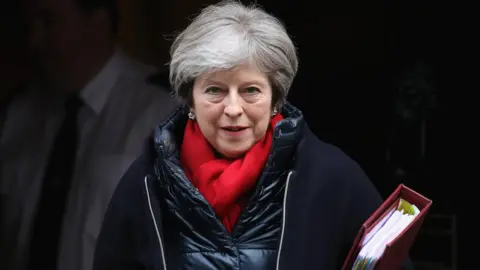Theresa May 'considering NI trip to help clinch deal'
 Getty Images
Getty ImagesPrime Minister Theresa May is considering coming to Northern Ireland next week to help secure a power-sharing deal, the BBC understands.
However, she would only travel if it was felt her input could bring the DUP and Sinn Féin closer together.
She has been criticised in the past for a "hands off" approach to the talks.
In response to those critics, Downing Street insisted the prime minister was being kept fully briefed by the secretary of state.
Northern Ireland has been without a devolved government since January 2017, when the governing parties - the DUP and Sinn Féin - split in a bitter row.
Several rounds of negotiations aimed at restoring their power sharing coalition ended in failure last year.
'Too close to call'
In recent weeks, the new Secretary of State Karen Bradley reconvened all-party talks in what was described as a last opportunity to revive devolution.
Now, with the negotiations entering a critical phase, the prime minister is considering getting more involved, but both the DUP and Sinn Féin have said significant gaps remain between them which are preventing a deal.
On Friday, the five main parties and representatives of both the British and Irish governments were due to sit down for more round table talks.
However, that did not happen because Sinn Féin and the DUP were not there.
Earlier, the outgoing Sinn Féin leader, Gerry Adams, said the outcome of the Stormont talks was too close to call.
Mr Adams, who will formally step down as party president on Saturday, told the Press Association: "It is a work in progress.
"It would be wrong to call it either way. There are still gaps. I would like to see it up and running again for the sake of the people."
A DUP spokeswoman said: "Northern Ireland cannot continue without ministers in place to make decisions.
"Our negotiating team has made progress, but there are still a lot of gaps and more work to be done."
